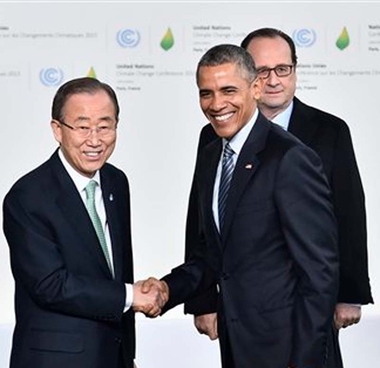Leaders of a warming Earth, in largest gathering ever, rethink global energy in Paris

Le Bourget, France (AP) — Addressing the twin threats of global warming and extremist violence, the largest group of world leaders ever to stand together kicked off two weeks of high-stakes climate talks outside Paris on Monday, saying that by striking an ambitious deal to cut emissions they can show terrorists what countries can achieve when they are united.
The gathering of 151 heads of state and government comes at a somber time for France, two weeks after militants linked to the Islamic State group killed 130 people around Paris. Fears of more attacks have prompted extra-high security and a crackdown on environmental protests — and threaten to eclipse longer-term concerns about rising seas and increasingly extreme weather linked to man-made global warming.
"The challenge of an international meeting has never been so great because it's the future of the planet, the future of life," French President Francois Hollande said after a moment of silence for attack victims in France, Lebanon, Iraq, Tunisia and Mali.
"There are two big global challenges that we must face," he added, urging leaders to create a world free from both environmental destruction and extremist violence.
Many of the leaders paid their respects at sites linked to the attacks on their way to the conference. President Barack Obama, in a late-night visit, placed a single flower outside the concert hall where dozens were killed, and bowed his head in silence.
"We stand with Paris," said U.N. climate change agency chief Christina Figueres said at talks near Le Bourget airfield, just north of the city. "The city of light, now more than ever, is a beacon of hope for the world."
On Sunday, hundreds of thousands of people rallied around the world, calling on the leaders to make real progress at the talks. Violence erupted after one peaceful demonstration in Paris, and hundreds of people were arrested. U.N. Secretary-General Ban Ki-moon took note of the protests in his opening remarks.
"The future of the people of the world, the future of our planet, is in your hands," Ban told negotiators. "We cannot afford indecision, half measures or merely gradual approaches. Our goal must be a transformation."
Ban, Hollande and other leaders called for a binding agreement and emphasized the role of private industry and money in solving what Hollande called "the climate crisis." They said the world must keep future warming to no more than another degree Celsius (1.8 degrees Fahrenheit) from now, and if possible half that to spare island nations threatened by rising seas.
The world has already warmed nearly 1 degree Celsius since the beginning of the industrial age, and 181 nations have made pledges to combat man-made carbon dioxide pollution. The negotiators are tasked with building a global treaty by the end of next week.
"We just have 11 short days before us," French Foreign Minister Laurent Fabius said as he took over as president of the negotiations. "Success is not yet assured, but it is within our grasp... The eyes of the world are upon us and there are great hopes."
Added the outgoing president, Peruvian Environment Minister Manuel Pulgar-Vidal: "We can show to the world that we can work together against climate change and against global terrorism."
Wide Paris-area highways usually packed with commuters were cordoned off to clear the way for all the VIPs. Riot police vans and plainclothes officers were stationed around the capital and by the national stadium, one of the targets of the Nov. 13 attacks that is near the climate conference venue.
The conference is aimed at the most far-reaching deal ever to tackle global warming. The last major agreement, the 1997 Kyoto Protocol, required only rich countries to cut emissions, and the U.S. never signed on.
Among several sticking points is money — how much rich countries should invest to help poor countries cope with climate change, how much should be invested in renewable energy, and how much traditional oil and gas producers stand to lose if countries agree to forever reduce emissions.
With that in mind, at least 19 governments and 28 leading world investors were announcing billions of dollars in investments to research and develop clean energy technology, with the goal of making it cheaper.
Backers include Obama, Microsoft co-founder Bill Gates, Facebook founder Mark Zuckerberg, billionaires George Soros and Saudi Prince Alaweed bin Talal, and Jack Ma of China's Alibaba.
Under the initiative, 19 countries pledge to double their spending on low- or no-carbon energy over the next five years. They currently spend about $10 billion a year, about half of that from the U.S., Brian Deese, senior adviser to Obama on climate and energy issues, told reporters in Washington.
Gates, the "intellectual architect" of the effort, committed $1 billion of his own money, U.S. Energy Secretary Ernest Moniz said.
"We'll work to mobilize support to help the most vulnerable countries expand clean energy and adapt to the effects of climate change we can no longer avoid," Obama wrote on his Facebook page.
In a separate announcement, the United States, Canada and nine European countries pledged nearly $250 million to help the most vulnerable countries adapt to rising seas, droughts and other impacts of climate change. Germany pledged $53 million, the U.S. $51 million and Britain $45 million.
The money will be made available to a fund for the least developed countries hosted by the Global Environment Facility, a major funder of environment projects worldwide. Other countries that contributed include Denmark, Finland, France, Ireland, Italy, Sweden and Switzerland.
By Seth Borenstein and Angela Charlton, Associated Press. Copyright 2015 The Associated Press. All rights reserved. This material may not be published, broadcast, rewritten or redistributed.
The Gayly – November 30, 2015 @ 6:25 a.m.





